Top
7 tricks For Excel


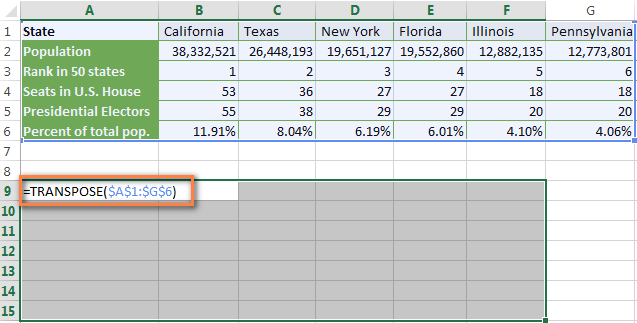
Reward: If
you need the normal of an arrangement of numbers, you can utilize the Formula=AVERAGE(Cell
Range). On the off chance that you need to whole up a segment of numbers, you
can utilize the equation =SUM(Cell Range).
Some of the
time, Excel appears to be unrealistic. I should simply enter a Formula, and essentially
anything I'd ever need to do physically should be possible consequently. Need
to blend two sheets with comparative information? Exceed expectations can do
it. Need to do straightforward math? Exceed expectations can do it. Need to
consolidate data in various cells? Exceed expectations can do it.
On the off
chance that you experience a circumstance where you have to physically refresh
your information, you're presumably passing up a major opportunity for a Formula
that can do it for you. Before putting
in a long stretch of time tallying cells or reordering information, search for
a handy solution on Excel - you'll likely discover one.Click here to download
our gathering of free Excel formats that will make your life less demanding.
In the soul
of working all the more effectively and dodging monotonous, manual work, here
are a couple of Excel traps to kick you off with how to utilize Excel. (Also,
to all the Harry Potter fans out there ... the pleasure is all mine ahead of
time.)
The most
effective method to Use Excel
In case
you're simply beginning with Excel, there are a couple of fundamental orders
that we propose you get comfortable with. These are things like:
Making
another spreadsheet without any preparation.
Executing
essential calculations in a spreadsheet, such as including, subtracting,
duplicating, and separating in a spreadsheet.
Composing
and organizing segment content and titles.
Exceed
expectations' auto-fill highlights.
Including or
erasing single segments, columns, and spreadsheets. Underneath, we'll get into
how to include things like numerous segments and lines.
Keeping
section and line titles unmistakable as you look past them in a spreadsheet,
with the goal that you comprehend what information you're filling as you move
additionally down the record.
For a
profound plunge on these nuts and bolts, look at our far reaching guide on How
to Use Excel.
Alright,
prepared to get into the quick and dirty? We should get to it.
7 Excel
Tips to Try
1) Pivot
Tables
Turn Tables
are utilized to rearrange information in a spreadsheet. They won't change the
information that you have, yet they can entirety up qualities and analyze
distinctive data in your spreadsheet, contingent upon what you'd like them to
do.
We should
investigate an illustration. Suppose I need to investigate what number of
individuals are in each house at Hogwarts. You might believe that I have very
little information, however for longer informational collections, this will
prove to be useful.
To make the
Pivot Table, I go to Data > Pivot Table. Exceed expectations will naturally
populate your Pivot Table, however you can simply change around the request of
the information. At that point, you have four alternatives to look over.
Report
Filter: This enables you to just take a gander at specific columns in your
dataset. For instance, on the off chance that I needed to make a channel by
house, I could decide to just incorporate understudies in Gryffindor rather
than all understudies.
Section
Labels: These could be your headers in the dataset.
Line Labels:
These could be your lines in the dataset. Both Row and Column names can contain
information from your segments (e.g. Initially Name can be dragged to either
the Row or Column name - it just relies upon how you need to see the
information.)
Esteem: This
segment enables you to take a gander at your information in an unexpected way.
Rather than simply pulling in any numeric esteem, you can whole, check, normal,
max, min, tally numbers, or complete a couple of different controls with your
information. Truth be told, as a matter of course, when you drag a field to
Value, it generally completes a check.
Since I need
to include the quantity of understudies each house, I'll go to the Pivot Table
and drag the House section to both the Row Labels and the Values. This will
entirety up the quantity of understudies related with each house.
Rotate Table

2) Add More
Than One New Row or Column
As you play
around with your information, you may discover you're always expecting to
include more lines and sections. Now and again, you may even need to include
several lines. Doing this one-by-one would be super repetitive. Fortunately,
there's dependably a less demanding way.
To include
different lines or segments in a spreadsheet, feature a similar number of prior
lines or sections that you need to include. At that point, right-click and
select "Embed."
In the case
beneath, I need to include an extra three lines. By featuring three columns and
afterward clicking embed, I'm ready to include an extra three clear lines into
my spreadsheet rapidly and effectively.
embed Spaces
3) Filters
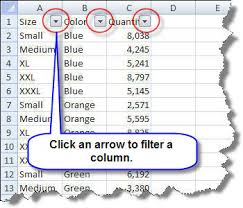
When you're
taking a gander at substantial informational indexes, you don't for the most
part should take a gander at each and every line in the meantime. Here and
there, you just need to take a gander at information that fit into specific
criteria. That is the place channels come in.
Channels
enable you to pare down your information to just take a gander at specific
columns at one time. In Excel, a channel can be added to every segment in your
information - and from that point, you would then be able to pick which cells
you need to see without a moment's delay.
How about we
investigate the case underneath. Include a channel by tapping the Data tab and
choosing "Channel." Clicking the bolt by the segment headers and
you'll have the capacity to pick whether you need your information to be sorted
out in rising or sliding request, and which particular lines you need to
appear.
In my Harry
Potter case, suppose I just need to see the understudies in Gryffindor. By
choosing the Gryffindor channel, alternate lines vanish.
Channels
Master Tip:
Copy and glue the qualities in the spreadsheet when a Filter is on to do extra
investigation in another spreadsheet.
4) Remove
Duplicates
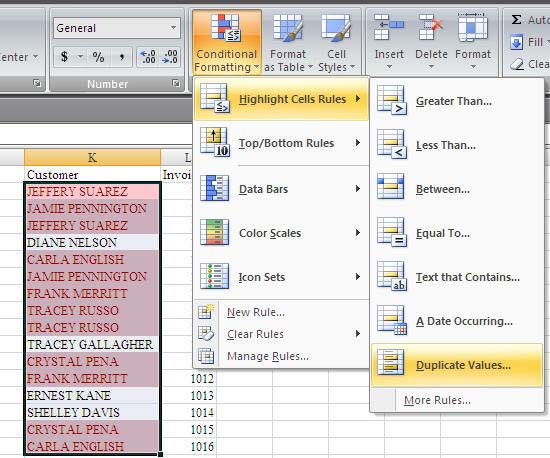

Bigger
informational indexes have a tendency to have copy content. You may have a
rundown of numerous contacts in an organization and just need to see the
quantity of organizations you have. In circumstances like this, evacuating the
copies comes in very convenient.
To evacuate
your copies, feature the line or section that you need to expel copies of. At
that point, go to the Data tab, and select "Evacuate Duplicates"
(under Tools). A fly up will seem to affirm which information you need to work
with. Select "Evacuate Duplicates," and you're ready.
Evacuate
Duplicates
You can
likewise utilize this element to expel a whole line in view of a copy section
esteem. So in the event that you have three lines with Harry Potter's data and
you just need to see one, at that point you can choose the entire dataset and
afterward expel copies in view of email. Your subsequent rundown will have just
special names with no copies.
5) Transpose

When you
have low lines of information in your spreadsheet, you may choose you really
need to change the things in one of those lines into segments (or the other way
around). It would require a ton of investment to reorder every individual
header - yet what the transpose highlight enables you to do is just move your
line information into segments, or the a different way.
Begin by
featuring the segment that you need to transpose into columns. Right-click it,
and after that select "Duplicate." Next, select the cells on your
spreadsheet where you need your first line or segment to start. Right-tap on
the cell, and afterward select "Glue Special." A module will show up
- at the base, you'll see an alternative to transpose. Watch that container and
select OK. Your section will now be exchanged to a column or the other way
around.
Transpose
6) Text to
Columns
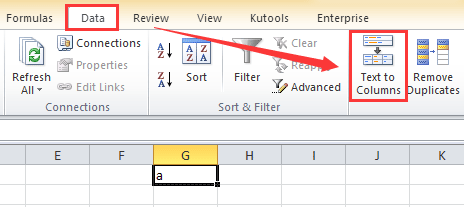

Consider the
possibility that you need to part out data that is in one cell into two unique
cells. For instance, possibly you need to haul out somebody's organization name
through their email address. Or then again maybe you need to isolate somebody's
full name into a first and last name for your email showcasing layouts.
On account
of Excel, both are conceivable. To start with, feature the section that you
need to part up. Next, go to the Data tab and select "Content to
Columns." A module will show up with extra data.
Initially,
you have to choose either "Delimited" or "Settled Width."
"Delimited"
means you need to separate the segment in view of characters, for example,
commas, spaces, or tabs.
"Settled
Width" implies you need to choose the correct area on every one of the
segments that you need the split to happen.
In the case
beneath, we should choose "Delimited" so we can isolate the full name
into first name and last name.
At that
point, it's a great opportunity to pick the Delimiters. This could be a tab,
semi-colon, comma, space, or something different. ("Something
different" could be the "@" sign utilized as a part of an email
address, for instance.) In our illustration, we should pick the space. Exceed
expectations will then demonstrate to you a review of what your new sections
will resemble.
When you're
content with the see, press "Next." This page will enable you to
choose Advanced Formats in the event that you decide to. When you're set, click
"Wrap up."
Content to
Column
Exceed
expectations Formulas
7) Simple
Calculations
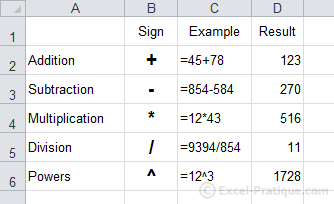

Notwithstanding
doing truly complex estimations, Excel can enable you to do basic number
juggling like including, subtracting, duplicating, or partitioning any of your
information.
To include,
utilize the + sign.
To subtract,
utilize the - sign.
To duplicate,
utilize the * sign.
To separate,
utilize the/sign.
You can
likewise utilize bracket to guarantee certain counts are done first. In the
case underneath (10+10*10), the second and third 10 were duplicated together
before including the extra 10. In any case, on the off chance that we made it
(10+10)*10, the first and second 10 would be included first.
Straightforward
Math








0 comments:
Post a Comment